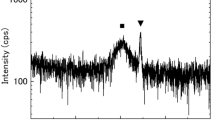Abstract
RECENTLY it has been shown1 that the maximum rate of evaporation of liquid carbon tetrachloride measured experimentally agrees to within the error of experiment with that deduced from the Knudsen equation In this equation, T is the temperature of the evaporating surface and P the saturated pressure of the vapour at that temperature, m is the mass in grams evaporating per second, and M the molecular weight of the liquid.
This is a preview of subscription content, access via your institution
Access options
Subscribe to this journal
Receive 51 print issues and online access
$199.00 per year
only $3.90 per issue
Buy this article
- Purchase on Springer Link
- Instant access to full article PDF
Prices may be subject to local taxes which are calculated during checkout
Similar content being viewed by others
References
Alty and Nicoll, Canadian Journal of Research, 4, 547 ; 1931.
Alty, Proc. Roy. Soc., A, 131, 554; 1931.
Author information
Authors and Affiliations
Rights and permissions
About this article
Cite this article
ALTY, T. Application of Knudsen's Law to the Evaporation of Water. Nature 130, 167–168 (1932). https://doi.org/10.1038/130167a0
Issue Date:
DOI: https://doi.org/10.1038/130167a0
This article is cited by
Comments
By submitting a comment you agree to abide by our Terms and Community Guidelines. If you find something abusive or that does not comply with our terms or guidelines please flag it as inappropriate.



